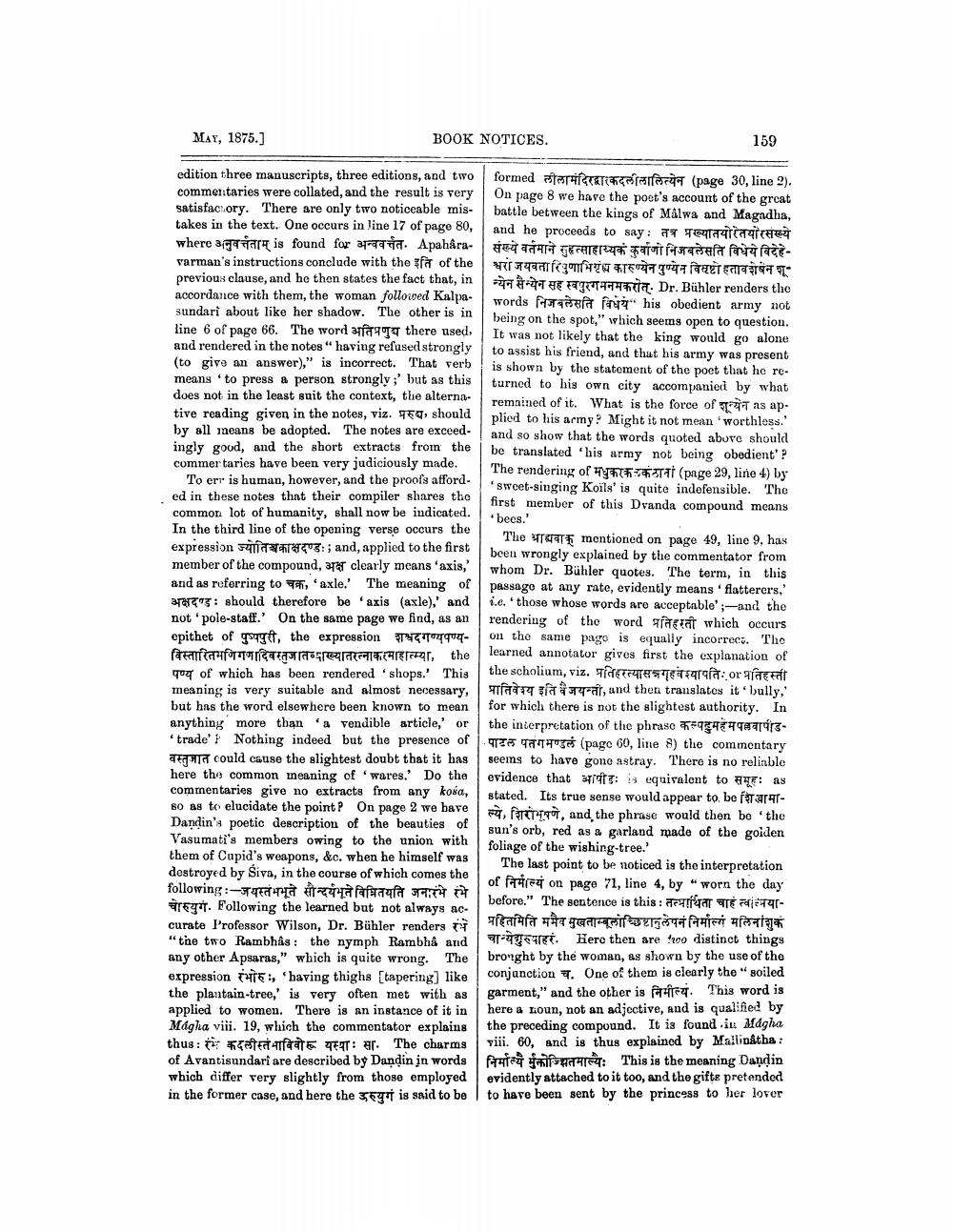________________
MAY, 1875.]
BOOK NOTICES.
159
edition three manuscripts, three editions, and two formed लीलामंदिरद्वारकदलीलालित्येन (page 30, line 2). commentaries were collated, and the result is very On page 8 we have the poet's account of the great satisfactory. There are only two noticeable mis- battle between the kings of Malwa and Magadha, takes in the text. One occurs in line 17 of page 80, and he proceeds to say: 9 yea where अनुवर्तताम् is found for अन्ववर्चत. Apahāra- संख्ये वर्तमाने सुहृत्साहाय्यकं कुर्वाणो निजबलेसति विधेये विदेहेvarman's instructions conclude with the fit of the | श्वरी जयवता रिपुणाभिध कारुण्येन पुण्येन विषष्ठो हतावशेषेन शूprevious clause, and he then states the fact that, in | न्येन सैन्येन सह स्वपुरगमनमकरोत्. Dr. Bihler renders the accordance with them, the woman followed Kalpa-|
words निजबलेसति विधय" his obedient army not sundari about like her shadow. The other is in
being on the spot," which seems open to question, line 6 of page 66. The word 3T997 there used.
It was not likely that the king would go alone
It was not likely that the king and rendered in the notes" having refused strongly to assist his friend, and that his army was present (to give an answer)," is incorrect. That verbis shown by the statement of the poet that he remeans to press & person strongly ;' but as this turned to his own city accompanied by what does not in the least suit the context, the alterna
remained of it. What is the force of as aptive reading given in the notes, viz. 90 should
plied to his army? Might it not mean worthless.' by all means be adopted. The notes are exceed and so show that the words quoted above should ingly good, and the short extracts from the be translated bis army not being obedient'? commertaries have been very judiciously made.
The rendering of The
TTi (page 29, line 4) by To err is human, however, and the proofs afford
sweet-singing Koils' is quite indefensible. The ed in these notes that their compiler shares the
first member of this Dvanda compound means common lot of humanity, shall now be indicated.
bees.' In the third line of the opening verse occurs the
The rea mentioned on page 49, line 9, has expression arv: ; and, applied to the first
been wrongly explained by the commentator from member of the compound, are clearly means 'axis,'
whom Dr. Bühler quotes. The term, in this and as referring to axle. The meaning of passago at any rate, evidently means 'flatterers, a gog: should therefore be axis (axle),' and i.e.' those whose words are acceptable':--and the not 'pole-staff.' On the same page we find, as an rendering of the word wracat which occurs epithet of पुण्यपुरी, the expression शवदगण्यपण्य- on the same page is equally incorrect. The विस्तारितमणिगणादिवस्तुजातम्पाख्यातरत्नाकरमाहात्म्या, the learned annotator gives first the explanation of
qoy of which has been rendered 'shops. This the scholium, viz. TETESTETOST: or a t meaning is very suitable and almost necessary, T a rrat, and then translates it bully." but has the word elsewhere been known to mean for which there is not the slightest authority. In anything more than a vendible article,' or the interpretation of the phrase *9989143
trade'P Nothing indeed but the presence of .TT3 (page 60, line 8) the commentary GP could cause the slightest doubt that it has seems to have gone astray. There is no reliable here the common meaning of 'wares.' Do the evidence that it is equivalent to He: as commentaries give no extracts from any kosa, stated. Its true sense would appear to be fer ararso as to elucidate the point P On page 2 we have
Fu, FACT, and the phrase would then be the Dandin's poetic description of the beauties of
sun's orb, red as a garland made of the goiden Vasumati's members owing to the union with
foliage of the wishing-tree. them of Capid's weapons, &c. when he himself was
The last point to be noticed is the interpretation destroyed by Siva, in the course of which comes the
of free on page 71, line 4, by "worn the day following :--- R aftaara TTT
before." The sentence is this: a hreytt. Following the learned but not always ac
rare rcurate Professor Wilson, Dr. Bühler renders
प्रहितमिति ममैव मुखताम्बूलांच्छिष्टानुलेपनं निर्माल्ग मलिनांशुकं "the two Rambhâs: the nymph Rambha and
agere. Here then are too distinct things any other Apsaras," which is quite wrong. The bronght by the woman, as shown by the use of the expression 16:, 'having thighs [tapering] like conjunction . One of them is clearly the soiled the plantain-tree,' is very often met with as garment," and the other is refrez. This word is applied to women. There is an instance of it in hero a Loun, not an adjective, and is qualified by Magha viii. 19, which the commentator explains the preceding compound. It is found in Mágha thus: ti eta ET: a. The charms viii. 60, and is thus explained by Mallinatha: of Avantisundari are described by Dandin jn words निर्माल्य कोज्यितमाल्यः This is the meaning Dandin which differ very slightly from those employed evidently attached to it too, and the gifte pretended in the former case, and here the set is said to be to have been sent by the princess to her lover




